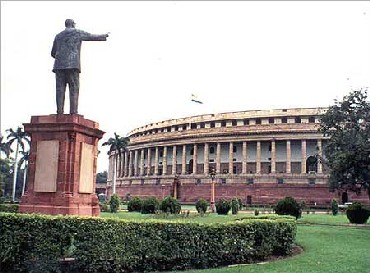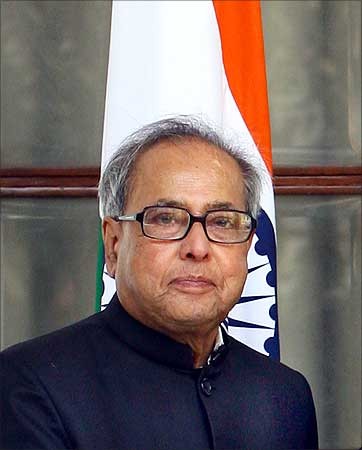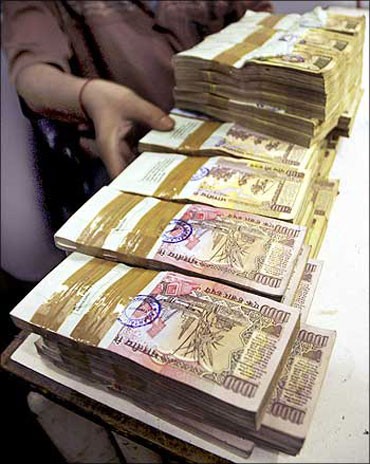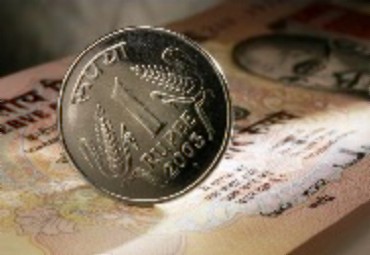Photographs: Courtesy rajyasabha.nic.in A K Bhattacharya in New Delhi
This is that time of the fiscal year when finance ministry officials get a little tense. With about eight weeks left for the presentation of the Union Budget for the next year, they come under pressure not just to prepare a new set of numbers on the government's finances, but also to defend what they tabled before Parliament about a year ago.
This year, however, it was a little unusual. Until even a couple of weeks ago, the finance ministry officials were quite cool about meeting the promises made for the 2010-11 Budget.
That scenario, however, has changed now and shows how the state of government finances is as fickle as perhaps that of India's politics.
...
Will the recent political troubles impact the Budget?
Image: Finance Minister Pranab MukherjeePhotographs: B Mathur/Reuters
Finance Minister Pranab Mukherjee's Budget early this year had projected a decline in the government's fiscal deficit to 5.5 per cent of gross domestic product or GDP, down from 6.7 per cent recorded in 2009-10.
Experts had questioned the assumptions behind that fiscal deficit reduction plan.
The finance minister had proposed to achieve the 1.2 percentage point cut in fiscal deficit mainly through two non-tax revenue-raising measures almost to the tune of 1.1 per cent of GDP - auction of licences for 3G and broadband wireless access services, and disinvestment of government equity in public sector undertakings.
...
Will the recent political troubles impact the Budget?
Photographs: Reuters
The task of reducing the fiscal deficit looked even more challenging when the Budget numbers showed that there was no provision for meeting the deficits of oil marketing companies even though the government showed no political will to implement the Kirit Parikh committee's recommendations on oil sector reforms.
The big worry then was if there was no oil price increase, if the government failed to get the budgeted revenue from the auction of telecom licences and if the disinvestment plan did not fare as expected, the government's fiscal deficit reduction plan would remain, well, just a plan.
...
Will the recent political troubles impact the Budget?
By end-June, however, such worries were largely over. The government completed the telecom licence auction that garnered almost three times more revenue than the budgeted figure.
It raised the prices of petrol, diesel and liquefied petroleum gas or LPG. It also gave oil companies the freedom to fix petrol prices in future and announced that such freedom for other petroleum products was on the anvil.
Disinvestment of government equity in public sector undertakings also began and by October, the success of Coal India Limited's public issue of shares showed that the disinvestment target of Rs 40,000 crore (Rs 400 billion) was very much within reach.
...
Will the recent political troubles impact the Budget?
Image: Telecom licence auction earned close to Rs 1.3 lakh crore of revenuePhotographs: B Mathur/Reuters
However, as 2010 comes to an end, the mood in North Block is not that sanguine.
Yes, the telecom licence auction has given it close to Rs 1.3 lakh crore of revenue, but its expenditure in excess of the approved Budget under various heads has nullified some of those gains.
Disinvestment proceeds have so far been only about Rs 22,000 crore (Rs 220 billion), a little more than half the annual target.
There is now a big question mark on the government's ability to meet the target as the recent political troubles have dampened market sentiment.
...
Will the recent political troubles impact the Budget?
Worse, the government is facing political resistance to any proposal to increase prices of diesel, LPG and kerosene even though international crude oil prices have already crossed $92-93 a barrel, substantially up from $75 a barrel when the last price revision took place for these products in June.
Since there is no Budget provision for meeting the deficits of the oil marketing companies, they would have to take a financial hit to the extent of two-thirds of their total losses as ONGC and Oil India would compensate them for only one-third of the losses.
Thus, for the markets, the disinvestment of oil companies - ONGC and Indian Oil Corporation - has ceased to be an attractive proposition.
...
Will the recent political troubles impact the Budget?
For the finance ministry, it is a double whammy. It will not get the revenue from the sale of equity in public sector units and its expenditure will go up by a few thousand crores of rupees.
Mr Mukherjee may still manage to meet the fiscal deficit target of 5.5 per cent of GDP for the full year, thanks to the tax revenue buoyancy and higher GDP growth than originally estimated.
However, the government's failure to implement oil sector reforms this year will cause him a bigger worry for the next year.
...
Will the recent political troubles impact the Budget?
The tasks for next year will not only be to reduce the fiscal deficit to 4.8 per cent of GDP, but the bigger challenge will come from the unfinished agenda for reforms.
It is now certain that the government will not be able to meet the April 2011 deadline for the introduction of the goods and services tax.
Reforms of the oil sector appear doubtful, given the political mood that prevails in the country at present. This will also dampen prospects of disinvestment of more government equity in oil companies.
...
Will the recent political troubles impact the Budget?
Image: The illuminated South Block and North Block in New Delhi. The North Block houses India's finance ministryPhotographs: B Mathur/Reuters
The next three months, therefore, are crucial for Mr Mukherjee and his team in North Block.
If he could fix these problems during these months, his numbers for the next year's Budget would look more real and relatively easy to achieve.
Indeed, he could then think of setting targets that are a little more ambitious.











article